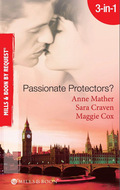Książki nie można pobrać jako pliku, ale można ją czytać w naszej aplikacji lub online na stronie.
Czytaj książkę: «The Man Behind The Mask»
The Man Behind the Mask
How to Melt a Frozen Heart
Cara Colter
The Man Behind the Pinstripes
Melissa McClone
Falling for Mr. Mysterious
Barbara Hannay

MILLS & BOON
Before you start reading, why not sign up?
Thank you for downloading this Mills & Boon book. If you want to hear about exclusive discounts, special offers and competitions, sign up to our email newsletter today!
Or simply visit
Mills & Boon emails are completely free to receive and you can unsubscribe at any time via the link in any email we send you.
Table of Contents
Cover
Title Page
How to Melt a Frozen Heart
ABOUT THE AUTHOR
DEDICATION
CHAPTER ONE
CHAPTER TWO
CHAPTER THREE
CHAPTER FOUR
CHAPTER FIVE
CHAPTER SIX
CHAPTER SEVEN
CHAPTER EIGHT
CHAPTER NINE
CHAPTER TEN
CHAPTER ELEVEN
CHAPTER TWELVE
CHAPTER THIRTEEN
CHAPTER FOURTEEN
CHAPTER FIFTEEN
EPILOGUE
The Man Behind the Pinstripes
ABOUT THE AUTHOR
DEDICATION
CHAPTER ONE
CHAPTER TWO
CHAPTER THREE
CHAPTER FOUR
CHAPTER FIVE
CHAPTER SIX
CHAPTER SEVEN
CHAPTER EIGHT
CHAPTER NINE
CHAPTER TEN
CHAPTER ELEVEN
CHAPTER TWELVE
CHAPTER THIRTEEN
Falling for Mr. Mysterious
ABOUT THE AUTHOR
CHAPTER ONE
CHAPTER TWO
CHAPTER THREE
CHAPTER FOUR
CHAPTER FIVE
CHAPTER SIX
CHAPTER SEVEN
CHAPTER EIGHT
CHAPTER NINE
CHAPTER TEN
CHAPTER ELEVEN
CHAPTER TWELVE
EPILOGUE
Copyright
How to Melt a Frozen Heart
CARA COLTER lives in British Columbia with her partner, Rob, and eleven horses. She has three grown children and a grandson. She is a recent recipient of an RT Book Reviews Career Achievement Award in the ‘Love and Laughter’ category. Cara loves to hear from readers, and you can contact her or learn more about her through her website: www.cara-colter.com.
To my favorite animal lover, Margo Jakobsen, and her beloved, the true Prince of Pomerania, Phaut.
CHAPTER ONE
BRENDAN GRANT AWOKE with a start. At first he heard only the steady beat of rain on the roof, but then the phone rang again, shrill, jangling across his nerves. His eyes flicked to his bedside clock.
Three o’clock.
He felt his heart begin to beat a hard tattoo inside his chest. What good could ever come of a 3:00 a.m. phone call?
But then he remembered, and even though he remembered, he reached over and touched the place in the bed beside him. Two and a half years later and he still felt that ripple of shock at the emptiness. Becky was gone. The worst had already happened.
He groped through the darkness for the phone, picked it up.
“Yeah?” His voice was raspy with sleep.
“Charlie’s dying.”
And then the phone went silent in his hands.
Brendan lay there for a moment longer, holding the dead phone, not wanting to get up. He didn’t really even like Charlie. They were going to start breaking ground on the lakeside living complex, Village on the Lake, tomorrow. His design had already attracted the attention of several architectural magazines, and based on the plan, the project had been nominated for the prestigious Michael Edgar Jonathon Award.
Still, as always, before they broke ground, and even after, he struggled with a feeling of it not being what he had wanted, missing the mark in some vague way he could not quite define. He recognized the stress was beginning. He was a man who needed his sleep.
But with a resigned groan, he sat up, swung his legs over the side of the bed, and sat there for a moment, his head in his hands, listening to the rain on the roof. He was so sick of rain. He certainly didn’t want to go out in it at three in the morning.
Then, with a sigh, Brendan reached for his jeans.
Ten minutes later, he was on Deedee’s front stoop, hammering on her door. Her house was a two-minute drive from his. Brendan turned and looked out over his neighborhood. They both enjoyed locations on “The Hill,” still Hansen’s most prestigious neighborhood, and even on such a ghastly night the views were spectacular.
Through wisps of mist, he could see the whole city, pastel-painted turn-of-the-century houses nestled under mature maples, clinging to the sides of steep hills. Beyond the houses and the cluster of downtown buildings, lights penetrated the gloomy gray and reflected in the black, restless waters of Kootenay Lake.
Brendan turned back as the door opened a crack. Deedee regarded him suspiciously, as if there was a possibility that by some mean coincidence at the very same time she had called him, a home invader—Hansen’s first—was waiting on her front stair to prey on the elderly.
Satisfied it was Brendan Grant in the flesh, she opened the door.
“Don’t you look just like the devil?” she said. “Coming out of the storm like that, all dark menace and bristling bad temper. I used to say to Becky you had to have Black Irish in you somewhere. Or pure pirate.”
Brendan stepped in and regarded his grandmotherin-law with exasperated affection. Only Deedee would see a devil or a pirate in the doer of a good deed!
“I’ll try to contain the bristling bad temper,” he said drily. The darkness he could do nothing about. It was his coloring: dark brown eyes, dark brown hair, whiskers blacker than night. It was also his heart.
Deedee was ninety-two, under five feet tall, frighteningly thin. Still, despite the fact it was 3:15 in the morning and her cat, Charlie, was dying, she was dressed in her go-to-church best. She had on a pantsuit the color of pink grapefruit. A matching ribbon was tied in a bow in her snow-white curls.
Would Becky have looked like this someday? If she had grown old? The pain was sharp, his guilt so intense it felt as if a knife had been inserted underneath his ribs. but Brendan was accustomed to it coming like this, in unexpected moments, and he held his breath, waiting, watching himself, almost bemused.
Pain, but no emotion. A man so emotionally impoverished he had not shed a single tear for his wife.
Sometimes he felt as if his heart was a tomb that a stone had been rolled in front of, sealing it away forever.
“I’ll get my coat,” Deedee said. “I’ve already got Charlie in the cat carrier.”
She turned to retrieve her coat—pink to match her outfit—from the arm of a sofa, and he saw Charlie glaring balefully at him from a homemade carrier that looked like a large and very ugly purse.
Charlie’s head poked out a round hole, his ginger fur stuck up in every direction, his whiskers kinked, his eyes slit with dislike and bad temper. He made a feeble attempt to squeeze his gargantuan self out the tiny opening, but his quick resignation to defeat, and the raspy breathing caused by the effort, made Brendan aware that tonight was the end of the road for the ancient, cranky cat.
Deedee turned back to him, carefully buttoning her coat around her. Brendan picked up the cat carrier with one hand and crooked his other elbow. Deedee threaded her arm through his, and he nudged open the door with his knee, trying not to be impatient when the rain sluiced down his neck as she handed him a huge ring of keys.
“Lock the handle and the dead bolt,” she ordered, as if they were in a high-crime area of New York City.
Both locks were sticky, and Brendan made a note to come by and give them a squirt of lubricant the next time he had a chance.
Finally they turned toward his car, inched down the steep stairs that took them from her front stoop to the road. When they reached the flat walkway, he tried to adjust his stride to Deedee’s tiny steps. He was just under six feet tall, his build lithe with a runner’s sleekness rather than a bodybuilder’s muscle, but Deedee made him feel like a giant.
A bristling pirate of a giant.
Brendan found himself wishing she would have called one of her children to accompany her on this late-night trip to the vet’s office. But for a reason he couldn’t quite decipher—it certainly wasn’t his graciousness—it was him she turned to when she needed anything, from a lightbulb changed to her supply of liquid meal replacements restocked.
Deedee was not a nice little old lady. She was querulous, demanding, bossy, ungrateful and totally selfcen-tered. It had occurred to Brendan more than once that she called him because no one else would come. But Deedee was his inheritance from his late wife. Becky and Deedee had adored each other. For that reason alone he came when she called.
Finally, he had both the cat and Deedee settled, the animal on the backseat, the woman in the front. The carrier did not look waterproof and he hoped the cat would not have an accident that would bleed through to the seat. Of course, with Charlie it might not be an accident. It might be pure spite.
Regardless, the car was brand-new, all plush leather and purring power. Had Brendan bought it hoping to fill some emptiness? If so, he had failed colossally, like putting a pebble in a hole left by a cannonball. Brendan shook off the thought, annoyed. It was the lateness of the night, the strangeness of being awake at what seemed to him to be the witching hour, that made him vulnerable to uncharacteristic introspection.
He got in the driver’s side and started the engine, glanced at Deedee and frowned. She looked quite thrilled to be having this middle of the night outing, not like an old woman making the painful final journey with her cat.
“Which vet are you using? Is he expecting us?”
“I’ll give you directions,” she snapped.
It was the tone of voice she used right before she pronounced you an idiot, so he shrugged and put the car in drive, and pulled out into the wet, abandoned streets of Hansen.
He was determined to be patient. It was one more loss for her. Putting down her precious cat. She was entitled to be crabby tonight, and he did not want her to be alone at the vet’s office as the needle went in. He did not want her to be alone when she came home without her cat.
She gave him directions, and he drove in silence, the mountains on either side of the valley making the night darker, the water hissing up under the tires. The cat’s breathing was labored.
Deedee issued shrill commands for Brendan to slow down and squinted at the signs on every crossroad. Finally, she fished in her purse, took out a piece of paper and held it very close to her face.
“If you give me the address, this new car has GPS.”
She contemplated that, deeply suspicious of technology, then reluctantly gave him the information.
He put it in his system. They were headed into the neighborhood that bordered Creighton Creek. A stone’s throw from Hansen proper, the area was rural residential, with a collection of small, neat acreages. Because of the great location, and the land, it was a sought-after area for young professionals who had a dream of children, a golden retriever and a horse or two.
All Brendan had ever wanted, growing up the only child of a single mother, was that most elusive of things—normal. And when he’d been almost there, in a blink, everything was gone. There must have been something he could have done. Anything.
He felt the pain again, of being powerless, and again felt himself watching, wondering if at some unexpected moment he would just break open. If he did, he was certain it would shatter him, that the pieces would be so small there would be no collecting them and putting it all together again.
But no, he was able to focus on the small, old houses of Creighton Creek, which were slowly but surely being replaced with bigger ones. Brendan’s firm, Grant Architects, had designed many of the newer homes, and he allowed himself, as they drove by one of his houses—one with a particularly complicated roofline—to be diverted from the painful realization of the life he was not going to have by the reality of the one he did.
The house was beautiful. The home owners loved it. Again, he had to try and shake that feeling of having missed something.
“I don’t recall a vet located out here,” he said. “In fact, didn’t I take you and Charlie to Doc Bentley recently?”
“Dr. Bentley is an idiot,” Deedee muttered. “He told me to put Charlie to sleep. That there was no hope at all. ‘He’s old. He’s got cancer. Let him go.’” She snorted. “I’m old. Are you just going to let me go? Put me to sleep, maybe?”
Brendan cast Deedee a glance. Carefully, he said, “Isn’t that what we’re doing? Taking Charlie to have him put to, er, sleep?”
Deedee cranked her head toward him and gave him a withering look. “I am taking him to a healer.”
Brendan didn’t like the sound of that, but he carefully tried to strip any judgment from his voice. “What do you mean, a healer?”
“Her name’s Nora. She has that new pet rescue place. Babs Taylor told me she has a gift.”
“A gift,” he repeated.
“Like those old-time preachers who laid their hands on people.”
“Are you kidding me?” He began to look for a place to turn around. “You need a vet. Not a nut.”
“What I need is a miracle, and Dr. Bentley already told me he can’t give me one.” Deedee’s voice was high and squeaky. “Babs’s niece volunteers out there. She said somebody brought in a dog that was deader than a doornail. And Nora Anderson brought it back to life. With her energy.”
Brendan felt his mouth tighten in a hard line of cynicism. One thing Becky and her grandmother had had in common? They loved all things “woo-woo.” They actually believed in what they called psychics and mediums, had frowned at him when he had made disparaging remarks about fortune-tellers and gypsies.
An unfortunate mental picture of Nora was forming in his mind: dangling earrings, wildly colored head scarf, hideous makeup, dark blue eye shadow, a slash of blood-red on her lips.
“Can you keep a secret?” Deedee didn’t wait for him to respond, but lowered her voice conspiratorially, as if dozens could hear. “Clara, over at the post office, told me she thinks from the mail that she gets that Nora is Rover. You know, from the column? Ask Rover?”
He didn’t know.
“You can tell when you read it,” Deedee elaborated, still whispering. “Nora gets right inside their heads. The animals.”
“That must be helpful, so that she knows where to send the energy to,” he said, his tone deeply sarcastic. Deedee missed the sarcasm entirely, because she went on with enthusiasm.
“Exactly! I’m a great fan of Ask Rover, so I knew she was the one who could help Charlie. I don’t drive anymore,” Deedee said, as if Brendan, her favored chauffeur, didn’t know that, “and I can’t hear properly on the phone, so I wrote her a letter, and brought it right to the post office so I knew she’d get it the next day. She wrote me back right away saying she would send me—Charlie—some energy.”
Brendan felt a kind of helpless fury claw at him. Deedee nursed the worry that Hansen’s first home invader would target her. She double-locked her doors. She was suspicious of the checkout girl at the grocery counting out the wrong change! How could she fall for this?
“It worked,” Deedee whispered. “Charlie got better. But then he got worse again, and she wouldn’t answer my letters. I phoned, too, even though I can’t hear, but I got an answering machine. I hate those. No one returned my calls. Then tonight, Charlie’s breathing changed. I’m scared. I know he’s dying.”
Brendan hated it that she was scared, and hated it more that her fear had made her so vulnerable. “Did you send money?”
The silence was telling.
“Did you?”
“A little.”
His GPS system startled them both by telling him to turn right at the next crossroad. Suddenly he wanted very much to meet the person who would use an elderly woman’s fear over losing her beloved pet to bamboozle money out of her.
All the better if they rousted her from a deep sleep in the middle of the night!
He turned right; they went up a road he had never noticed before, and passed under an archway that spanned the road.
A sign hung from the archway, letters painted in fresh, primary colors. Nora’s Ark.
At any other time, he might have thought it was clever little play on words. Or maybe not. He didn’t like cute. He was an architect. He liked calculation, precision, math. He liked figuring out how large a load a beam could carry, and how to make a wall of glass that was structurally sound.
He liked the completely balanced marriage of art and science that was his work. If at the end of the project he always felt, somehow, he had missed the mark, wasn’t that part of what drove him to do even better the next time? To try again for that thing, whatever it was, that was just out of his reach?
Brendan considered himself pragmatic and practical, perhaps with a good measure of cynical thrown in. He was the man least likely to give himself over to whimsy. But given that it seemed to have been raining for forty days and forty nights, he felt a strange shiver along his spine that he was arriving at an ark of any sort.
Below the sign Nora’s Ark was a smaller one, announcing they were supported by the Hansen Community Betterment Committee.
His company was one of the charter members!
He shook off his annoyance, and drove over a wooden bridge that spanned a creek that was still raging with spring runoff, though it was the last day of June. Up ahead, carved out of the mountainous wilderness all around, a white house—almost a cottage—was illuminated in his headlights, surrounded by a picket fence and a yard where yellow climbing roses rioted.
Through the grim, pelting rain a light shone, warm and inviting, from inside, and the house seemed like a welcoming place, not the kind of place where a charlatan who cheated vulnerable old women would live.
Was someone awake? It was probably a good time for chanting and consulting cards. Though why do it if the mark wasn’t there?
Behind the house and yard, barely visible in darkness that was slowly giving way to a soggy predawn, he could see the huge silhouette of a barn.
“Oh, we’re here,” Deedee breathed happily. “It looks just the way I thought it would.”
That explained the appearance of the place. Homey. Welcoming. Like the old witch’s cottage in Hansel and Gretel.
All the better to dupe people, to lure them closer.
“You wait here,” Brendan said, and cut off Deedee’s protest with a firm slam of the car door. He walked up a path that smelled of perfume as he crushed damp fallen rose petals under his feet.
Then, out of the corner of his eye, back toward the barn, he saw a light fly up, heard the high-pitched whinny of a horse, and, straining against the sounds of the storm, he was sure he heard the startled cry of someone in trouble. A female in trouble.
CHAPTER TWO
TURNING FROM THE house, adrenaline pumping, his instincts on red alert, Brendan Grant ran toward the barn.
At first, he thought it was a pile of old rags in the churned-up mud of the paddock adjoining the barn. The pile was faintly illuminated by the fallen flashlight beside it. Then it moved. Heedless of the mud, he put one hand on the fence, leaped it, landed, raced to the still form. It looked like a child facedown in the mud.
His sense of urgency surged as he squatted down. He knew better than to try to move whoever it was without assessing the injuries.
“Are you all right?”
Movement from the heap of rags and a squeak of distressed surprise were a relief to Brendan. Then the pile of rags flipped over.
It was his turn to be shocked. It wasn’t a child, but a woman. Her hair reminded him of Charlie’s—ginger, sticking up all over the place, except where a clump of mud had flattened it to her skull. But even the mud that streaked her skin could not hide the exquisite loveliness of her pale face.
Her nose was dainty, faintly dusted with copper freckles. Her lips were plump and pink; her chin had a little jut to it that hinted at a stubborn temperament. A goose egg was rising alarmingly above her right eye.
Her eyes were amazing, wide-spaced, unusually large in the smallness of her face, a color of jade that flickered with light in the grayness of the night.
If this was Nora she was an enchantress of the kind who would have no need of makeup to weave her spell.
She was obviously very woozy, because she looked at him quizzically, and then oddly, reached up and touched his cheek, a faint smile on her face, as if she did not see a dark devil arrived on the tails of the storm, but something else entirely. Something that she recognized and welcomed.
His feeling of being enchanted—however reluctantly—increased.
Then abruptly she came to her senses. She seemed to realize she was flat on her back in the middle of the night, in the mud, with a strange man who oozed menace and bristling bad temper hovering over her.
Her eyebrows knit together in consternation and she struggled to sit up.
“Hey,” he said, his attempt at a soothing tone coming out of his mouth like rust, a hoarse croak. “Try not to move.”
She looked as if she had no intention of following his well-meaning instruction, so he laid a hand on her shoulder. It was tiny underneath a thin jacket that appeared to be soaking up rain rather than repelling it.
He could see a little bow on what could be her pajamas at the V of her jacket.
She shook off his hand, sat up, wincing from the effort. He’d been right about her chin giving a clue to her temperament. She was stubborn.
“Who are you?” she demanded. “What are you doing out here, on my property, at this time of night?”
He was annoyed with himself that the tone of her voice increased the sense of enchantment weaving through this miserable night. Despite the lack of welcome in her words, her voice reminded him of maple syrup, rich and smooth and sweet.
She scanned his face, that initial reaction of trust, of welcome, completely gone. Now she looked wary and stubborn and maybe just a little frightened.
What she didn’t have was the look of a person who would be trying to dupe an old lady out of her money.
No sense putting off the moment of truth.
“Are you Nora?”
She nodded. He let that sink in. No head scarf. No dangling earrings. Certainly no blue eye shadow, or slash of red at her mouth.
Brendan was aware that in a very short time he had started to hope the woman in a vulnerable little heap in the mud was not the same woman who had written Deedee a letter promising to heal her cat. With energy. For a fee.
He looked at her fresh face, tried to imagine dangling earrings and heavy makeup and the gypsy scarf, and found his imagination didn’t quite go that far. But fresh faced or not, she’d duped Deedee. He was already disillusioned by life, so why be disturbed by the gathering of a little more evidence?
Still, for the moment she looked faintly frightened, and he felt a need to alleviate that.
“I brought a cat out,” he said. “I heard a ruckus out here, saw a light and came to investigate.”
She considered his explanation, but looked doubtful. He suspected he didn’t look much like the kind of guy who would be attached to his cat.
“I heard you were a healer.” He tried to strip judgment from his tone, but he must have looked even less like the kind of guy who would put any kind of faith in a healer than one who would be attached to a cat, because her doubtful expression intensified.
“Who did you hear that from?” she asked uneasily. Her eyes skittered toward the fence, as if she was going to try and make an escape.
“Deedee Ashton.”
The name did not seem to register, but then she might be struggling to remember her own name at the moment.
“Can you tell me what happened?” he asked.
She put a hand to the goose egg above her eye.
“I don’t know for sure,” she said. “The horses might have knocked me over.”
He scanned the corral. Three horses were squeezed against the back fence, restless and white-eyed. He didn’t know much about horses, but these ones seemed in no way docile.
He told himself firmly that it was none of his business what kind of chances she took. He didn’t know her. He certainly didn’t care about her. Still, there was a certain kind of woman that could make a man feel he should be protective. That was the kind you really had to guard against, especially if you had already failed in the department of protecting the smaller and weaker and more vulnerable.
Brendan ordered himself not to comment. But, of course, his mouth disobeyed his mind.
“Given you’re about the size of a peanut, doesn’t it seem a touch foolhardy to decide to come mingle with your wild mustangs in the middle of the night?”
She glared at him. Her look clearly said don’t tell me what to do, which was fair.
“Unless, of course, you hoped your energy was going to tame them?”
Those amazing eyes narrowed. “What do you know about my energy?”
“Not as much as I plan to.”
“Why does that sound like a threat?” she asked.
He shrugged.
She tossed her head at that, but he saw a veil drop smoothly over the flash of fire in those green eyes, as if he had hurt her by being a doubter. You’d think, in her business, she would have developed a thicker skin.
But he would have to deal with all that later. She had begun to shiver from being wet, but when she tried to move, a small groan escaped her lips.
He knew he shouldn’t move her. But she was clearly freezing. Now was not the time to confront her about any claims she had made to Deedee. He shrugged out of his coat and wrapped it around her.
She looked as if she planned to protest his act of chivalry, but when he tucked his coat around her, he could clearly see the warmth seduced her. She snuggled inside it instead. She looked innocent, about as threatening as a wounded sparrow.
Stripping away any censure he felt about her claims of extraordinary power, he said, “Can you move your hands? How about your feet? Can you turn your head from side to side for me?”
“What are you? A doctor?” Despite the protest, she tested each of her body parts as he named it.
He touched the ugly-looking bump rising above her right eye. She winced.
“You’re not lucky enough to have conjured up a doctor. You’ll have to work on your conjuring a little. I’m an architect. Luckily, I have a little construction site first aid experience.”
As he had hoped, at the mention of his profession—oh, those professional men were so trustworthy—her wariness of him faded, though annoyance at his conjuring remark had turned her green eyes to slits that reminded him of Charlie.
He picked the flashlight out of the mud and shone it in her eyes, looking for pupil reaction.
“Tell me about your cat,” she said, swatting at the light.
“So you can send him energy?”
“Why are you here, if you’re so cynical?”
He felt a shiver along his spine, similar to what he had felt when he passed under the ark sign. What if he hadn’t come along when he had? Would she have lain in the mud until she had hypothermia? Would the horses have trampled her?
But he was certainly not going to let her see that for a moment he was in the sway of an idea that some power he did not understand might have drawn him here at the exact moment she needed him.
Ridiculous. If such a power existed, where had it been the night Becky had needed it?
He actually saw Nora flinch, and realized he had grimaced. It no doubt gave him the pirate look that Deedee had seen earlier.
Keeping his tone level, Brendan said, “I’m here as the result of a comedy of errors. I thought I was on my way to a legitimate practitioner of animal medicine.”
“With your cat.”
He nodded.
“You don’t really look like a cat kind of guy.”
“No? What do cat kind of guys look like?”
She studied him, the eyes narrow again. “Not like you,” she said decisively.
“So, what do I look like? A rottweiler kind of guy? Bulldog? Boxer?”
Her look was intense. If a person believed that energy crap, they would almost think she was reading his. He raised the light again, shining it in her eyes, hoping to blind her. He was not sure he liked the sensation of being seen.
“You’re not a dog kind of guy, either.”
Accurate, but not spookily so.
“In fact,” she continued, “I’d be surprised if you even had a plant.”
Okay. That was about enough of that.
“I never said it was my cat.” He turned off the light and put it in his pocket. “I don’t think your back is injured, so I’m going to pick you up and carry you to the house.”
“You are not picking me up! I’ll walk.” She tried to find her feet, and glared at him as if the fact that it was his jacket swimming around her stopped her from doing so. “If you’ll just give me your hand—”
But Brendan did not just give her a hand. It wasn’t the jacket. The small effort of trying to get up had made her turn a ghostly white, the freckles and mud standing out in stark relief. So he ignored her protests, slid his arms under her shoulders and her knees and scooped her up easily.









